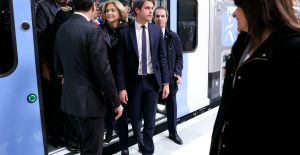The reasons for the anger are deep and go beyond the endless squabbles between VTCs and taxis... At the call of several unions, taxi drivers from "all over France" have planned to "converge" this Monday towards the Place du Trocadéro in Paris, in order to denounce the “new unsustainable pricing imposed by the National Union of Health Insurance Funds (UNCAM)”. And it is this decision - taken “unilaterally” by Health Insurance to the detriment of taxis approved by the two unions of the FNAT and the FNDT - which is at the heart of their demands. Because today, while this service has always existed, patient transport no longer attracts taxi drivers, who prefer to carry out more profitable “classic” journeys.
“Transporting a sick person is not transporting a package. The driver has an obligation to accompany: he picks you up from your hospital room, makes sure you gather your belongings, your prescriptions and takes you back with your belongings under his arm, helping you up to the fifth floor of your building if necessary”, explains the president of the FNAT Bernard Crebassa, had to point out that this “working time” is in fact “unpaid”.
And that's the whole problem today: more and more taxi drivers no longer want to be regulated and prefer to carry out "classic" journeys. Because if contracted drivers often claim to be the only social link for patients and even believe that they are replacing a failing local public service, the fact remains that they cannot provide this service at a loss, the unions emphasize. the origin of the mobilization this Monday. In this sense, the latter regret that “the social organization disregards the economic reality of the sector”. Result: according to professionals in the sector, “it has become increasingly difficult for patients to book taxi trips approved for the transport of seated patients”. A “serious failure by the State” according to them “in its duty to guarantee access to care”.
But really, what’s the problem? The dilemma is undeniable: on the one hand, Health Insurance wants to save money, and on the other, taxi drivers refuse to be paid less for a service that earns them less and less. “The costs of transport carried out by a taxi company can only give rise to reimbursement if the taxi company has previously concluded an agreement with a local CPAM organization”, recalls Health Insurance, during the presentation of the new 2024 standard agreement for approved taxis.
And it is precisely this which arouses the indignation of taxi drivers, while Health Insurance has, according to them, “unilaterally published this standard agreement, exempt from its price ceilings for discounts on approved journeys” before “immediately call on the departmental funds to renew before mid-February their agreement with the taxi companies, whose backs are pushed to the wall”. “We cannot run at a loss. If we continue to have excessively significant price discounts required by the CPAM, we will no longer be profitable, we will no longer be able to drive,” testifies for example Xavier Cavelan, a Norman taxi driver who assures France 3 Normandie that he is financially dependent on these trips. medical.
“Taxis are not prescribers but simple workers of healthcare policy in France. They only intervene on a transport prescription, prescribed by the medical profession and in no case do they generate demand, nor do they derive any enrichment from its increase,” specifies the president of the FNDT Emmanuelle Cordier. For professionals in the sector, it is only a matter of mobilizing “for the survival of the medical taxi which is today threatened”, in order “to continue to guarantee to French people who require it, a quality service, adapted to their needs”. “Just as they preserve the dignity of patients in their care pathways, they also demand to exercise their profession with complete dignity,” write the two unions of the FNAT and the FNDT, demanding “to be urgently received at Matignon, by the “all the different ministries linked to the challenges of the sector”.
They also denounce the obligation of shared medical transport, which “is an interesting mode of regulation both for Health Insurance and for taxis”, according to the new convention, which pleads to “promote” this solution. “By taking several people on the same journey, we can compensate for the shortfall, but it is difficult to organize. Customers do not have the same time constraints, we will have to keep sick people waiting,” reacts a taxi driver on this subject to France 3 Normandie.
A new way of thinking, which comes in a context where the government intends to achieve no less than 3.5 billion euros in the health system, as part of the finance bill (PLFSS). At the end of October, the Minister Delegate in charge of Public Accounts Thomas Cazenave announced his ambition to make “some savings on medical transport”. Far from being anecdotal, this measure plans to strongly encourage patients who use medical transport to go to a medical appointment to share it, under penalty of paying a supplement.

 What is chloropicrin, the chemical agent that Washington accuses Moscow of using in Ukraine?
What is chloropicrin, the chemical agent that Washington accuses Moscow of using in Ukraine? Poland, big winner of European enlargement
Poland, big winner of European enlargement In Israel, step-by-step negotiations for a ceasefire in the Gaza Strip
In Israel, step-by-step negotiations for a ceasefire in the Gaza Strip BBVA ADRs fall almost 2% on Wall Street
BBVA ADRs fall almost 2% on Wall Street Children born thanks to PMA do not have more cancers than others
Children born thanks to PMA do not have more cancers than others Breast cancer: less than one in two French women follow screening recommendations
Breast cancer: less than one in two French women follow screening recommendations “Dazzling” symptoms, 5,000 deaths per year, non-existent vaccine... What is Lassa fever, a case of which has been identified in Île-de-France?
“Dazzling” symptoms, 5,000 deaths per year, non-existent vaccine... What is Lassa fever, a case of which has been identified in Île-de-France? Sánchez cancels his agenda and considers resigning: "I need to stop and reflect"
Sánchez cancels his agenda and considers resigning: "I need to stop and reflect" “Amazon product tester”: the gendarmerie warns of this new kind of scam
“Amazon product tester”: the gendarmerie warns of this new kind of scam “Unjustified allegations”, “promotion of illicit products”… Half of the influencers controlled in 2023 caught by fraud repression
“Unjustified allegations”, “promotion of illicit products”… Half of the influencers controlled in 2023 caught by fraud repression Extension of the RER E: Gabriel Attal welcomes a “popular” ecology project
Extension of the RER E: Gabriel Attal welcomes a “popular” ecology project WeWork will close 8 of its 20 shared offices in France
WeWork will close 8 of its 20 shared offices in France “We were robbed of this dignity”: Paul Auster’s wife denounces the betrayal of a family friend
“We were robbed of this dignity”: Paul Auster’s wife denounces the betrayal of a family friend A masterclass for parents to fill in their gaps before Taylor Swift concerts
A masterclass for parents to fill in their gaps before Taylor Swift concerts Jean Reno publishes his first novel Emma on May 16
Jean Reno publishes his first novel Emma on May 16 Cannes Film Festival: Meryl Streep awarded an honorary Palme d’Or
Cannes Film Festival: Meryl Streep awarded an honorary Palme d’Or Omoda 7, another Chinese car that could be manufactured in Spain
Omoda 7, another Chinese car that could be manufactured in Spain BYD chooses CA Auto Bank as financial partner in Spain
BYD chooses CA Auto Bank as financial partner in Spain Tesla and Baidu sign key agreement to boost development of autonomous driving
Tesla and Baidu sign key agreement to boost development of autonomous driving Skoda Kodiaq 2024: a 'beast' plug-in hybrid SUV
Skoda Kodiaq 2024: a 'beast' plug-in hybrid SUV The home mortgage firm rises 3.8% in February and the average interest moderates to 3.33%
The home mortgage firm rises 3.8% in February and the average interest moderates to 3.33% This is how housing prices have changed in Spain in the last decade
This is how housing prices have changed in Spain in the last decade The home mortgage firm drops 10% in January and interest soars to 3.46%
The home mortgage firm drops 10% in January and interest soars to 3.46% The jewel of the Rocío de Nagüeles urbanization: a dream villa in Marbella
The jewel of the Rocío de Nagüeles urbanization: a dream villa in Marbella Europeans: a senior official on the National Rally list
Europeans: a senior official on the National Rally list Blockade of Sciences Po: the right denounces a “drift”, the government charges the rebels
Blockade of Sciences Po: the right denounces a “drift”, the government charges the rebels Even on a mission for NATO, the Charles-de-Gaulle remains under French control, Lecornu responds to Mélenchon
Even on a mission for NATO, the Charles-de-Gaulle remains under French control, Lecornu responds to Mélenchon “Deadly Europe”, “economic decline”, immigration… What to remember from Emmanuel Macron’s speech at the Sorbonne
“Deadly Europe”, “economic decline”, immigration… What to remember from Emmanuel Macron’s speech at the Sorbonne These French cities that will boycott the World Cup in Qatar
These French cities that will boycott the World Cup in Qatar Champions Cup: Toulouse with Flament and Kinghorn against Harlequins, Ramos replacing
Champions Cup: Toulouse with Flament and Kinghorn against Harlequins, Ramos replacing Tennis: still injured in the arm, Alcaraz withdraws from the Masters 1000 in Rome
Tennis: still injured in the arm, Alcaraz withdraws from the Masters 1000 in Rome Sailing: “Like a house that threatens to collapse”, Clarisse Crémer exhausted and in tears aboard her damaged boat
Sailing: “Like a house that threatens to collapse”, Clarisse Crémer exhausted and in tears aboard her damaged boat NBA: Patrick Beverley loses his temper and throws balls at Pacers fans
NBA: Patrick Beverley loses his temper and throws balls at Pacers fans


















